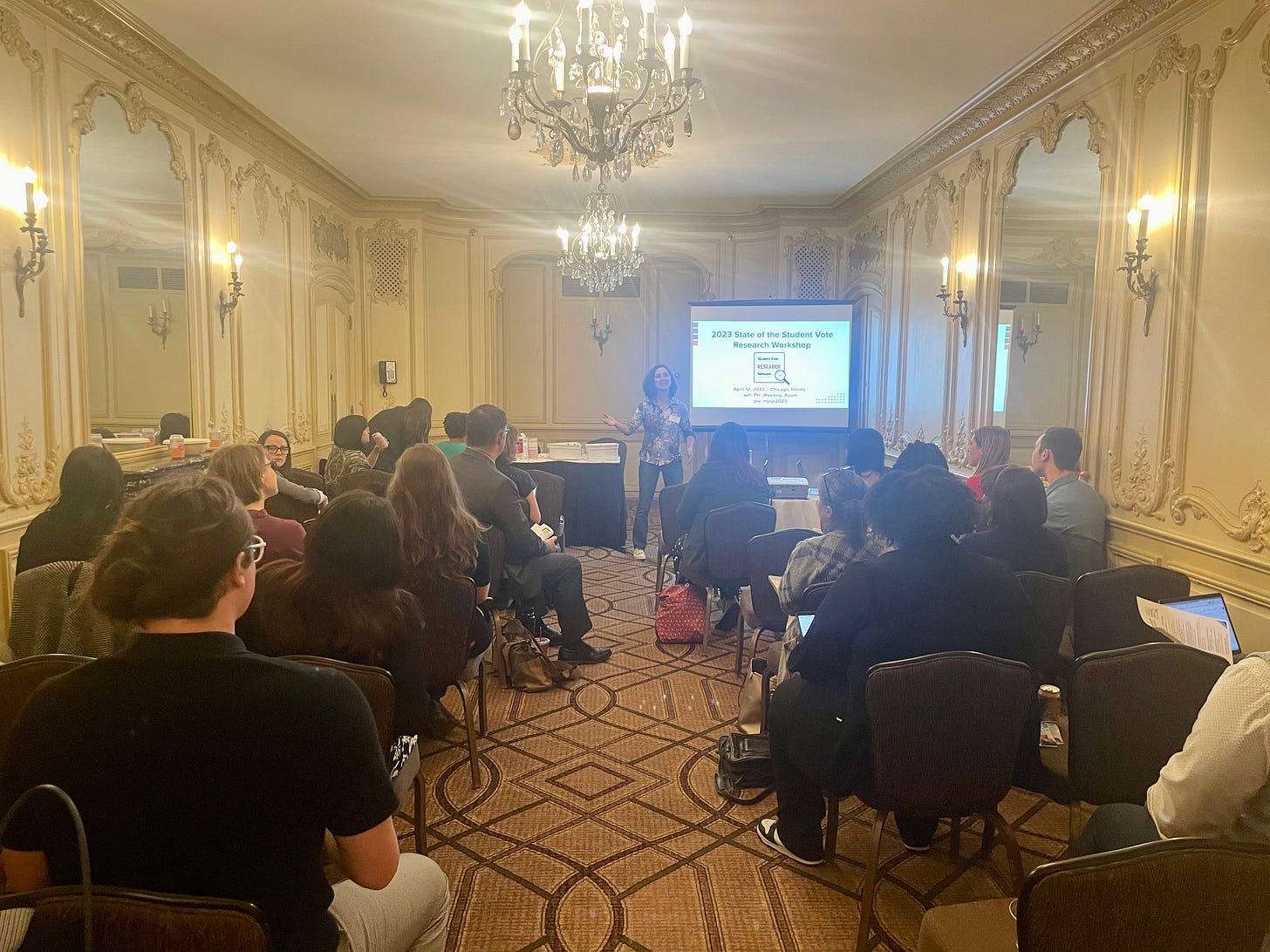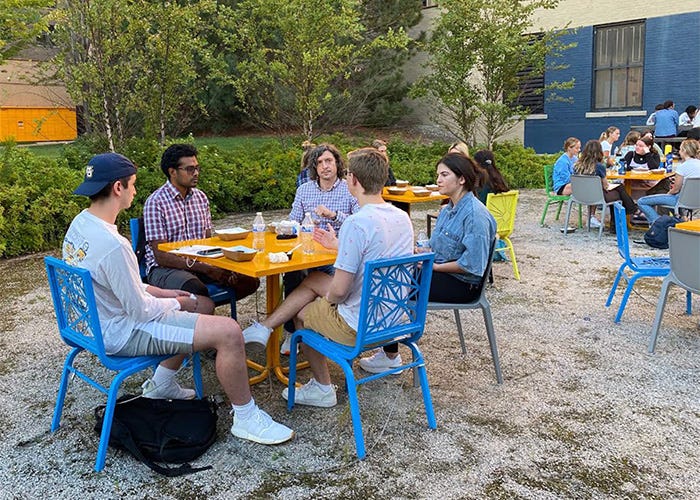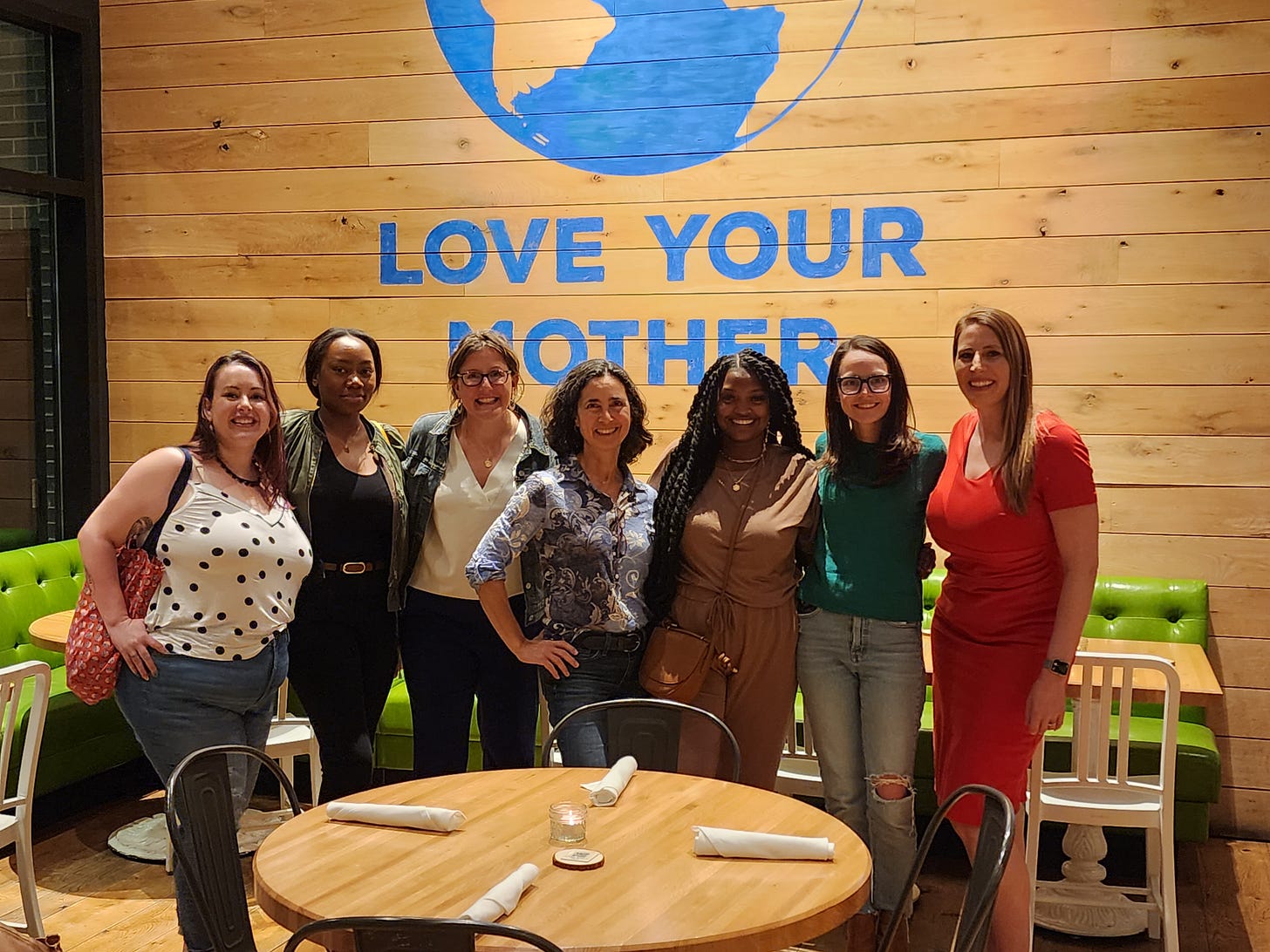What we learned at the 2023 SVRN workshop
Dozens of scholars and practitioners joined us in Chicago to discuss new research happening in the Student Vote Research Network. We learned a lot this past year and the future is bright!

What we learned last year
We’ve made great progress since last year’s SVRN research workshop, but there’s still a lot to learn.
Dozens of scholars and practitioners gathered in Chicago on April 12 to share updates and ideas related to student voter engagement and our common goal of 100% student voting.
After presentations from our 2022 subgrant recipients and Team Michelson, and a quick coffee break, we discussed where we want to go moving forward.
What did we learn from our projects last year? Future substack posts from our subgrant recipients will provide more details on each project, but here’s the view from 10,000 feet:
1) Deliberative methods of teaching can help students understand why they should vote.
Dr. Crystal Harris (Governors State University) finds that many first-year Gen-Z students have firsthand experience in political engagement, and want to voice their concerns about racism, sexism, classism, and homophobia. They’ve participated in protests, but they feel insecure about voting, or think it won’t make a difference. Dr. Harris is exploring ways to incorporate deliberative pedagogy to encourage students to also use elections as a means of creating change.
Preliminary results indicate that helping students connect current events and community organizers with 1965 Civil Rights Movement activists makes students feel more prepared to vote and more interested in seeking out information about election issues. Dr. Harris continues to collect data on how best to use these deliberative classroom activities to cultivate high turnout among first-year college students.
2) Students in states with more restrictive laws need specialized and resource intensive support to vote.
Dr. Leah Sweetman (Saint Louis University) and Dr. Sabrina Tyuse (Saint Louis State University) worked with an HBCU and a community college in Missouri, collecting survey and focus group information on what’s hindering student engagement.
That some states including Missouri are making it harder to vote is not news. Dr. Sweetman and Dr. Tyuse found that a large proportion of students tried to vote but were deterred due to their lack of familiarity with vote-by-mail procedures and deadlines for out-of-state voters. As they continue to collect data, they are also exploring methods of mitigating these challenges without violating state laws, such as training peer leaders about absentee voting rules, providing transportation to students, and testing how best to communicate with students about their options and important deadlines.
3) Boosting student self esteem is a promising strategy for boosting voter turnout.
Jahnavi Rao from New Voters, on behalf of her research team, shared evidence from an RCT of students at MSIs (including HBCUs) and community colleges. They explored the power of reinforcing identities in changing students’ vote intentions. Reinforcing identities to generate attitudinal and behavioral change is a long and strong line of research. Building on that scholarship, Rao and her team found that encouraging students to feel powerful made male respondents more likely to pledge to vote. The next step here is to conduct further RCTs to see if there are identity messages that work well for women and other groups, and whether their behaviors are also affected.
4) Commuter students face unique challenges due to information and time constraints
Dr. Lara Rusch (University of Michigan-Dearborn) is collecting data from commuter students at UM-Dearborn and Henry Ford College, expanding our understanding of how commuter students think and behave in the voting arena. Many existing studies look at commuters as a subset of the student body at largely-residential institutions, but the culture of majority or solely-commuter campuses is very different. While her project is ongoing, preliminary results suggest opportunities to link campus organizations (e.g., student clubs) to local community organizations, building on on- and off-campus political engagement.
5) In low salience elections, “Dialogue Dinners” increased intent to vote and mobilized others to vote.


Dr. Amber Wichowsky and Savannah Charles (Marquette University) shared findings from their Dialogue Dinners, using pre- and post-dinner surveys to measure changes in intent to vote and encourage others to vote. They found negligible effects for the 2022 Midterms, but stronger findings for the 2023 special Wisconsin Supreme Court election. This research pulls together strands of existing scholarship on the power of peers as trusted messengers and hosted meals as a means of generating deeper (and longer) conversations. Their ongoing work seeks to determine better ways of generating participation, or other means of delivering similar experiences to students.
6) Educating and mobilizing student voters can have an impact on their families and home communities.
Kesicia Dickinson presented on behalf of Team Michelson, which has been conducting a project focused on students of color as knowledge brokers. College students are an audience that often receives substantial information about registering and voting; students are bringing this information home and sharing it with their families and communities. The work follows up on a 14-campus study that Team Michelson completed in 2020, when students were sharing information about how to vote during the COVID-19 pandemic and the rules and procedures changed in many parts of the country. The data show that political socialization on this topic does not follow the traditional parent-to-child pathway. Instead, it is often reversed, moving from child to parent, or bidirectional, with parents sharing a culture of participation and students sharing logistical and procedural knowledge.
These updates represent important progress in our understanding of how to move toward 100% student voting, and we look forward to sharing via this substack more detailed reports about each of the projects. Stay tuned!
Where do we go from here?
After the presentations, participants in Chicago moved to a discussion of how best to move forward on three major questions:
How do we strengthen local leadership committed to 100% student voter participation at every college and university?
How do we identify and implement the most impactful tactics for mobilizing and educating student voters?
How does everyone else, especially local election officials and other policymakers, help local campus leaders succeed in reaching 100% student voting?
We don’t (yet) have all the answers, but the future looks bright. The room was abuzz with ideas for new research projects and partnerships, and folks in the room exchanged both ideas and contact information.
We talked about campus culture, about engaging faculty more directly, and about how making connections across institutions is crucial for moving forward with robust RCTs of tactics and messaging. Participants also talked about the deep differences between campuses located in states with commitments to making voting more convenient, in contrast with states that are using what we know about how to increase student voting to change the rules and push back against student participation.

The future is bright.
The bottom line is, we’ve learned a lot in the last year, folks are making great use of the Student Vote Research Network to share ideas and form collaborations, and there’s quite a bit of work left to do.
I left Chicago invigorated and inspired. In a very short time, we’ve created a vibrant network that is generating important research and paving a road toward even more. Thanks to all of you who joined us. I look forward to seeing an even larger network come together in 2024. You can be part of it – now is the time to make plans for the next round of research, following up on these reports and diving into the ideas from the group conversation. With your participation, I am confident that we can get to 100% student voting.
Melissa R. Michelson is Dean of Arts & Sciences and Professor of Political Science at Menlo College. She also serves as Chair of the Student Vote Research Network Steering Committee.


